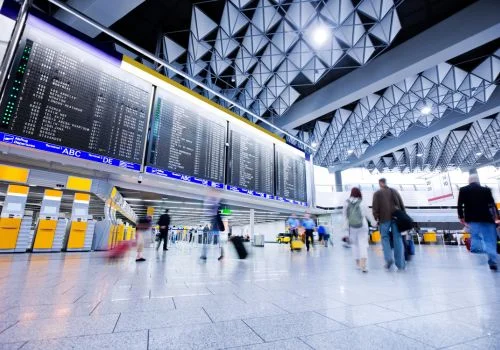

In an era where airports are under mounting pressure to improve operational efficiency, meet sustainability goals, and control costs, the concept of a Global Competency Center (GCC) offers a transformative solution. GCCs enable airports to centralize expertise, digitize critical processes, and enable 24x7 operational oversight—all while driving down costs by 40% to 70%. This white paper explores how airports can implement and benefit from GCCs, leveraging proven frameworks.
Real-world bottlenecks such as mismanaged turnarounds, incomplete customs documentation, and inefficient ground handling are addressed using mission-critical follow-up systems and digital workflows.
Consider this scenario: Your aircraft is moments away from landing. Gate allocation is still pending, the ground handling crew hasn’t been notified, and customs documentation remains incomplete. The result? Delays, extended turnaround times (TAT), missed connections, and dissatisfied passengers. These are not isolated incidents but symptoms of systemic inefficiencies. Airports operate as high-pressure hubs, often managing thousands of moving parts without real-time visibility or unified coordination. Rising passenger volumes, strict SLA requirements, and post-pandemic recovery have only intensified the need for smarter operations.
A Global Competency Center centralizes specialized functions in a remote, expert- managed environment. In the airport context, this includes:
With GCCs, airports can access top-tier resources, analytics, and automation from a cost- effective offshore or hybrid model, slashing costs while enhancing performance.
3.1Cost Reduction (40%–70%)
3.2Improved Turnaround Times (TAT)
3.3Enhanced Passenger Experience
3.4Compliance and Documentation
3.524x7 Operational Control
GCCs facilitate the digitization of manual, error-prone workflows:
Every stage is time-stamped and tracked via an SLA engine, providing full transparency and accountability. Integration with existing airport systems allows real-time updates and workflow synchronization.
An advanced Mission-Critical Follow-Up System can support airports under high-stakes operational conditions. Key features include:
utilization and reduces taxi time and fuel consumption.
GCCs help airports monitor and enforce SLAs across departments:
Exceptions are auto-flagged, escalated, and resolved with centralized reporting to support continuous improvement.
The arrival of Advanced Air Mobility (AAM)—including electric vertical takeoff and landing (eVTOL) aircraft—promises a leap in urban and regional transport. But it also demands airport readiness in:
GCCs play a vital role by coordinating with tech providers, regulators, and urban planners, ensuring that AAM integration is smooth, safe, and cost-efficient.
Digitization and centralized monitoring via GCCs reduce the carbon footprint by:
Additionally, data from GCCs can power predictive analytics to optimize terminal utilities (e.g., lighting, HVAC) based on real-time passenger flows.
This strategy has been at the forefront of digital enablement in aviation. The suite of airport solutions, including the Mission-Critical Follow-Up System, KPI dashboards, and SLA
engines—has helped aviation stakeholders:
It enables collaboration with airport authorities, FBOs, GHAs, and private aviation companies (including Part 135 operators) to ensure seamless operations.
As airports look to modernize and adapt to new mobility models, cost control, and operational excellence are non-negotiable. Global Competency Centers, when
implemented strategically, offer a powerful lever to transform airport operations—from chaotic and reactive to streamlined and proactive. Whether it's faster gate assignments, efficient baggage handling, or preparing for AAM, GCCs unlock a future-ready pathway.
With the right transformation partner, airports don’t just meet expectations, they redefine them.